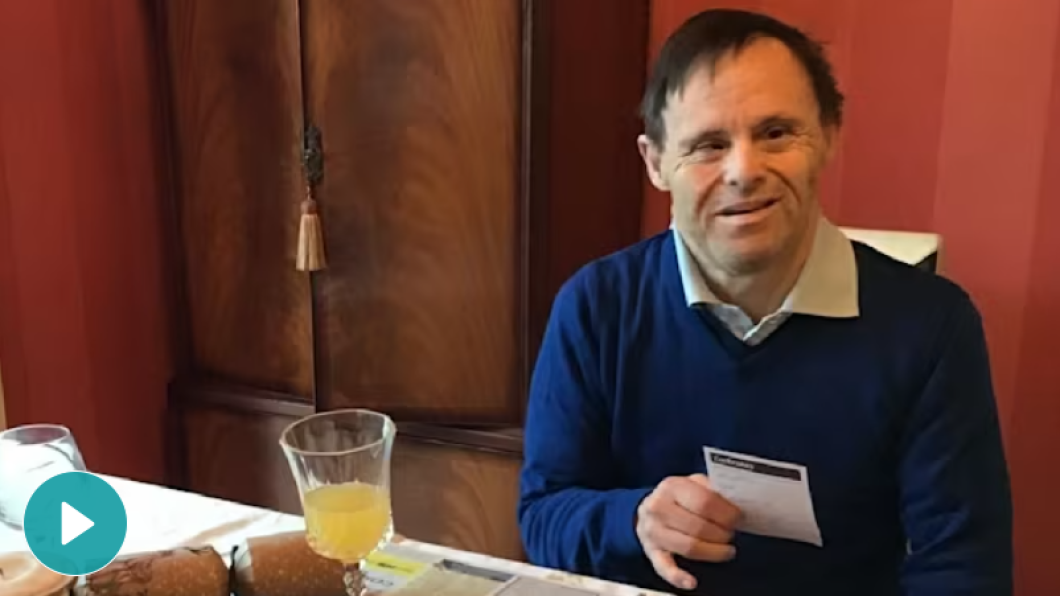
Under care, but they died of starvation
By Louise Kinross
In January this year, we heard about how Florence Girard, a 54-year-old Canadian woman with Down syndrome, starved to death in a homeshare funded by the British Columbia government.
We are now learning that Adrian Poulton (photo above), a 56-year-old British man with Down syndrome, starved to death in an NHS hospital after nine days with no food. He was recovering from a broken hip in 2021. Doctors mistakenly assumed he didn't eat solid food, and his family, who were with him daily, assumed he was receiving adequate nutrition through an IV.
This is a deeply painful story for me. My own son, who doesn't speak, was hospitalized for nine nights in an ICU this summer. He deteriorated overnight in the ER after staff dismissed our request to have an IV placed in his foot instead of his hand, because he has a phobia of the hand placement. The resulting distress ramped up his breathing problems.
However, once admitted, we had many discussions about how my son would have to be fed through a nose tube or a central line if he remained there for more than a few days. How was this not on the radar of doctors who assessed Poulton for NINE whole days?
Poulton's family took it for granted that he would get the nourishment he needed to recover from surgery. They didn't think to question his treatment until he was so gravely ill that he died.
Last month, a government-ordered report found British people with an intellectual disability in 2023 died on average 20 years younger than the general population, and almost 40 per cent of those deaths were avoidable.
We have our own research here in Ontario. In 2019, a study released by ICES found Ontario adults with developmental disabilities were nearly four times more likely to die early than their non-disabled peers, and fared worse on four other health indicators, including repeat emergency room visits.
This ITV video is part of an investigation into early deaths in this population in the U.K. It's worth watching. It includes the story of Poulton, who had his family with him daily after surgery to mend a broken hip.
Doctors incorrectly listed him as "nil by mouth." His family assumed that he was getting adequate nutrition through an IV. By the time the family realized the medical error, Poulton had deteriorated so badly that he died.
“Not being medical, we just naturally thought he was having nutrition, a feed," his father Derek said. "But as it turns out, they were starving him.”
The video also includes the story of Louis Cartwright, a British teen with Down syndrome who died in his mother's arms at home after ER doctors sent him home—twice—saying he wasn't seriously ill.
Cartwright, described as "a super healthy kid," was taken to hospital in 2023 when he became pale and unwell. He was too anxious to have a blood test, so his parents repeatedly asked clinicians to sedate him, so they could draw blood and figure out what was going on. They refused.
Without the blood test, a recent inquest couldn't determine why he died.
Back in 2013, Connor Sparrowhawk died in an NHS treatment unit after drowning in a bath in a locked room. The teen had autism and seizures and was not to be left alone. In 2018, Southern Health was fined just over $1.8 million dollars for his preventable death. This summer Sparrowhawk's mother Sara Ryan, a professor of social care at Manchester Metropolitan University, published Critical Health and Learning Disabilities: An Exploration of Erasure and Social Murder. In the U.K., the diagnosis of intellectual disability is called "learning disability."
This plain language summary of the book is a must read. In it, Ryan says: "We know why people with learning disabilities die and yet the government does nothing to stop it happening. There is no action. Social murder happens when you know why people die early and do nothing about it."
Like this content? Sign up for our monthly BLOOM e-letter, follow BLOOM editor @LouiseKinross on X, or @louisekinross.bsky.social on Bluesky, or watch our A Family Like Mine video series.